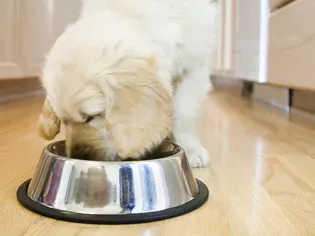What to Do if Your Puppy Is Constipated
Updated on 04/26/24

Puppy Constipation: A Comprehensive Guide to Causes, Symptoms, and Treatment
Constipation in puppies is a common issue that can cause discomfort and distress to your furry friend. Understanding the causes, symptoms, and treatment options can help you provide prompt and effective care for your puppy.
Causes of Constipation in Puppies
* Dietary changes: Abrupt changes in diet, such as introducing new foods or switching brands, can disrupt the digestive system and lead to constipation.
* Dehydration: Puppies who do not drink enough water can develop hard, dry stools.
* Ingesting foreign objects: Puppies are curious creatures and may ingest foreign objects such as toys, bones, or bedding, which can block the digestive tract.
* Medical conditions: Underlying medical conditions, such as intestinal parasites, allergies, or thyroid issues, can also cause constipation.
* Medications: Certain medications, such as antibiotics and pain relievers, can have side effects that include constipation.
Symptoms of Constipation in Puppies
* Straining or discomfort: Puppies may strain to defecate, or appear uncomfortable when trying to pass stools.
* Hard, dry stools: Stools may be small, hard, and dry.
* Infrequent bowel movements: Puppies may not have bowel movements for several days or longer.
* Loss of appetite: Constipation can lead to a loss of appetite and lethargy.
* Vomiting: In some cases, constipation can cause vomiting.
Treatment Options for Puppy Constipation
* Dietary modifications: Offering a bland diet, such as boiled chicken and rice, can help regulate the digestive system. Adding pumpkin puree to the diet can also provide fiber and promote bowel movements.
* Hydration: Ensuring that your puppy has plenty of access to fresh water can help soften stools and prevent dehydration.
* Enemas: In severe cases, an enema may be necessary to clear the impacted stool. Consult with your veterinarian before administering an enema.
* Laxatives: Over-the-counter laxatives are not recommended for puppies without veterinary consultation. However, your veterinarian may prescribe a safe and effective laxative.
* Surgery: In rare cases, surgery may be necessary to remove a foreign object or treat an underlying medical condition that is causing constipation.
Examples of Puppy Constipation Scenarios
* Scenario 1: A 10-week-old Labrador puppy has not had a bowel movement in three days. She strains and appears uncomfortable when trying to defecate. Her diet was recently changed to a new brand of puppy food.
Diagnosis and Treatment: The puppy's symptoms suggest constipation likely caused by the dietary change. The veterinarian recommends a bland diet of boiled chicken and rice, as well as plenty of fresh water. If the constipation persists, a laxative may be prescribed.
* Scenario 2: An 8-month-old Golden Retriever puppy vomits frequently and has hard, dry stools. He is also lethargic and has lost his appetite.
Diagnosis and Treatment: The puppy is likely experiencing constipation due to a medical condition. The veterinarian performs tests to rule out underlying causes such as parasites or thyroid issues. Treatment may involve antibiotics, pain relievers, or dietary modifications.
Preventing Puppy Constipation
* Feed a high-quality diet that is appropriate for your puppy's age and size.
* Make gradual dietary changes and introduce new foods slowly.
* Ensure that your puppy has plenty of access to fresh water at all times.
* Monitor your puppy's bowel movements and consult your veterinarian if there is any concern about constipation.
* Keep your puppy away from potential foreign objects that could be ingested.
Conclusion
Constipation in puppies is a manageable issue with prompt and appropriate treatment. By understanding the causes, symptoms, and treatment options, you can provide optimal care for your puppy and ensure their digestive health and well-being. Remember to consult with your veterinarian if you have any concerns about your puppy's bowel movements or overall health.
Explore More Pets

Basic Training
Puppy and Baby Introductions

Working Dog Breeds
All About Search and Rescue Dogs

Dog Treatments
Puppy Vaginitis: Signs, Causes and Treatment

Dog Adoption
After More Than 1,200 Days in the Shelter, Coco Goes Home

Basic Training
How to Train Your Puppy to Go on Potty Pads

Hybrid Dog Breeds
The Difference Between a Mutt, Mixed Breed, or Designer Dog?

Dog Treatments
Nail Problems in Dogs

Puppies
7 Reasons Why Two Dogs Are Better Than One